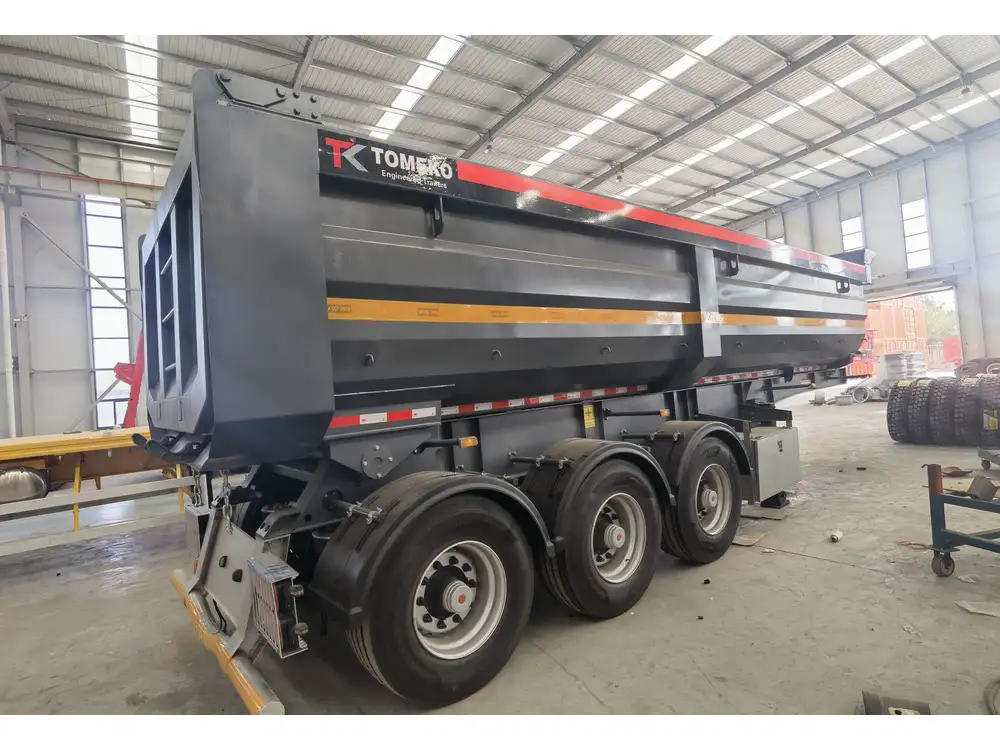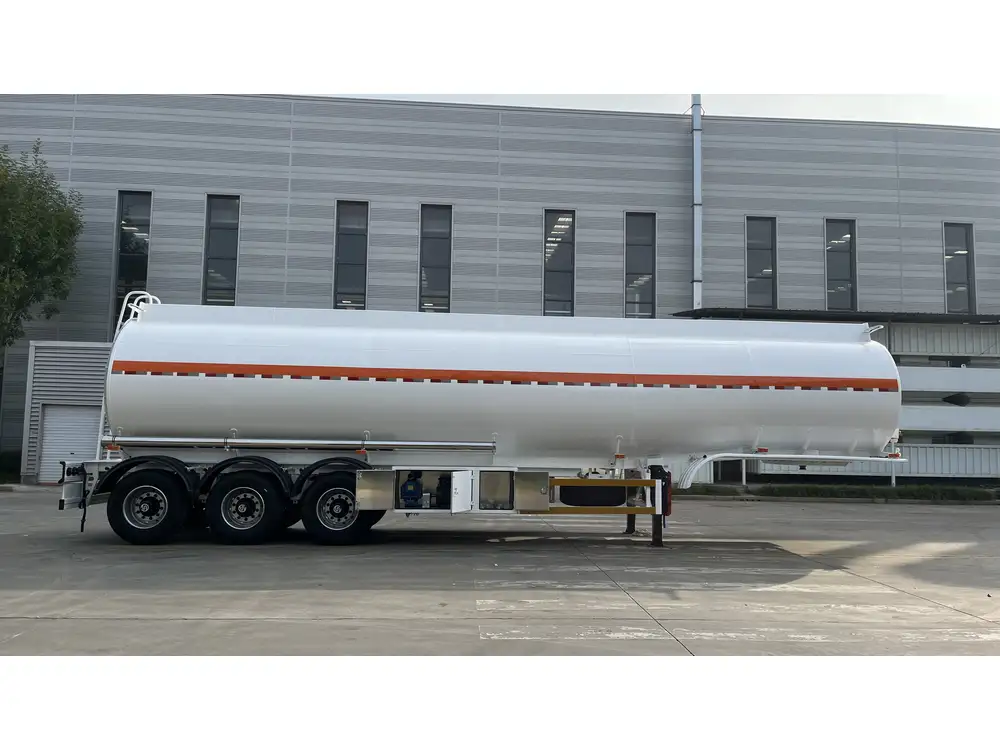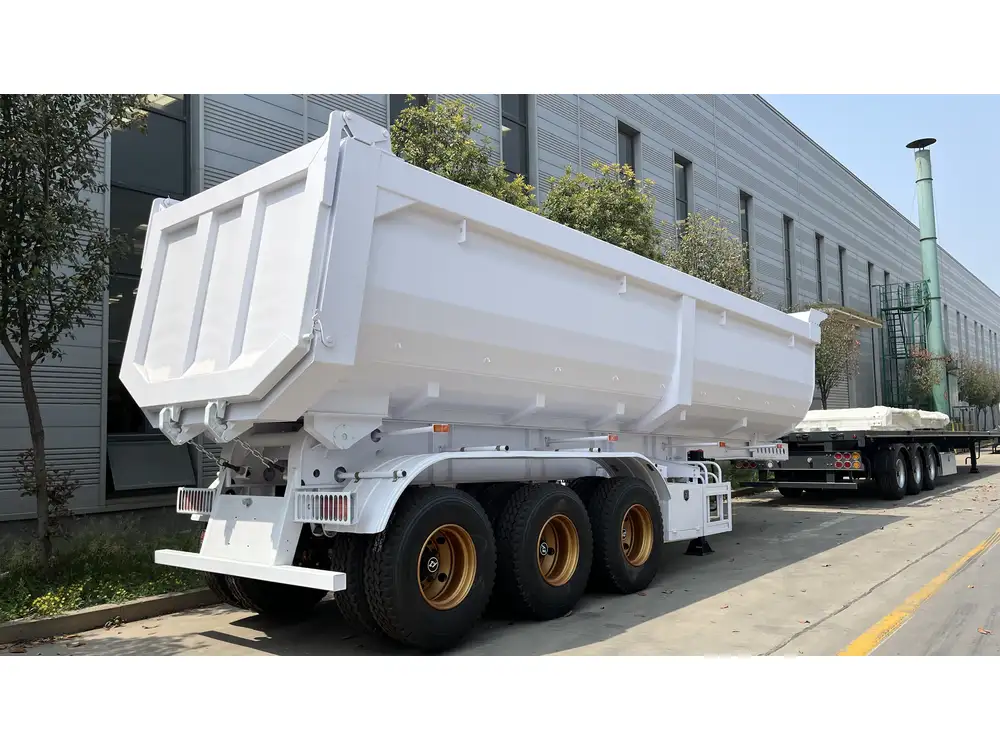Choosing the right semi-trailer is a significant decision for businesses that rely on transporting heavy materials. Among various trailer types, dump trailers stand out for their versatility and efficiency. In this guide, we will delve into everything you need to know about dump trailers, specifically focusing on their functionalities, benefits, and how to select the appropriate model that suits your requirements.
What is a Dump Trailer?
A dump trailer is a specialized type of semi-trailer designed for the efficient transportation of loose materials such as sand, gravel, dirt, and other aggregates. The distinguishing feature of a dump trailer is its ability to unload cargo quickly and efficiently through an elevated dumping mechanism.
Structure and Mechanics
Dump trailers generally consist of:
- Chassis: The framework that supports the trailer and provides structural integrity.
- Bed: The flat surface where materials are loaded. This can be equipped with various functional upgrades like side rails or tarps.
- Hydraulic System: The apparatus responsible for lifting the bed, usually powered by hydraulic cylinders.
- Axles and Tires: Critical for handling weight distribution and road stability.

Types of Dump Trailers
To cater to diverse industry needs, dump trailers come in various designs:
| Type | Description | Common Uses |
|---|---|---|
| Single Axle | Designed for lighter loads, offering agility and ease of maneuverability. | Landscaping, small construction jobs |
| Tandem Axle | Provides additional support for heavier loads while maintaining stability. | Construction debris, gravel transport |
| Triple Axle | Capable of handling the heaviest loads with superior stability. | Large construction sites, industrial applications |
| End Dump | Dumps material out of the rear; ideal for transporting road construction materials. | Roadwork, site clearing |
| Side Dump | Dumps material sideways; beneficial for unloading in tight spots. | Urban development, mining sites |
Key Advantages of Dump Trailers
Understanding the advantages of dump trailers is essential for making an informed purchase. Here are some critical benefits:
1. Efficiency in Loading and Unloading
Dump trailers excel in speeding up the loading and unloading process, which is crucial in job sites with time constraints. The hydraulic lifting mechanism allows for quick and precise dumping.

2. Versatility
These trailers can handle various materials, from loose soil to heavy construction debris. Their adaptability makes them a staple in diverse industries, including construction, landscaping, and mining.
3. Cost-Effective
While initial investments can be significant, the ability to efficiently transport materials can lead to overall cost savings. Businesses can save on labor costs since unloading does not require manual labor or additional machinery.
4. Robust Construction
Modern dump trailers are built with durable materials that can withstand harsh environmental conditions. Steel and aluminum options offer different benefits in terms of weight and strength.

Factors to Consider When Choosing a Dump Trailer
1. Weight Capacity
Understanding the weight capacity is paramount. Ensure that the trailer’s specifications align with the materials you intend to haul.
Table: Typical Weight Capacities for Different Dump Trailers
| Trailer Type | Weight Capacity (lbs) |
|---|---|
| Single Axle | Up to 10,000 |
| Tandem Axle | 10,000 – 20,000 |
| Triple Axle | Over 20,000 |

2. Material
The choice between steel and aluminum is vital:
- Steel: Generally more durable and heavier; suitable for rugged jobs.
- Aluminum: Lighter and resistant to rust, making it suitable for transportation efficiency.
3. Hydraulic System Quality
Select a dump trailer with a reliable hydraulic system for consistent performance. Investigate the type of hydraulic pump used and ensure it has positive user reviews regarding reliability.
4. Length and Dimensions
Evaluate the dimensions according to your intended load. Remember that a longer trailer may increase capacity but can also pose challenges when maneuvering on smaller job sites.

5. Price and Warranty
Compare products within your budget without skimping on essential features. Additionally, look for trailers with comprehensive warranties to ensure peace of mind in your investment.
Maintenance Tips for Dump Trailers
Regular maintenance of your dump trailer is vital to extend its life and maintain operational efficiency. Here are essential maintenance tips:
1. Routine Inspections
Conduct periodic inspections for structural integrity, especially focusing on the bed, axles, and hydraulic systems. This look-over ensures that all components are functioning correctly.

2. Hydraulic System Maintenance
Check hydraulic fluid levels routinely, and inspect hoses or cylinders for leaks or signs of wear. Properly lubricate moving parts to avoid unnecessary friction or damage.
3. Wheel and Tire Care
Inspect tires for tread wear and proper inflation. Uneven wear may indicate alignment issues that must be addressed.
4. Corrosion Protection
Treat exposed metal surfaces regularly. Utilize protective coatings or paint to deter rusting and prolong the trailer’s life.

Understanding the Regulations and Compliance
When operating dump trailers, understanding state and federal regulations is crucial. Common areas to review include:
1. Weight Limits
Each state has regulations governing weight limits for trailers on highways. Failure to comply may result in fines and increased operational issues.
2. Licensing and Permits
Depending on your locality, operating a dump trailer may require a commercial driver’s license (CDL) or specific permits for oversized loads. It’s essential to check local guidelines.

3. Safety Equipment
Ensure that your dump trailer is equipped with the necessary safety features, such as reflective tape, proper lighting, and tarping systems for loads that could spill.
The Future of Dump Trailers: Innovations and Trends
As technology advances, so does the world of dump trailers. Here are some trends shaping the industry:
1. Electric Hydraulics
The introduction of electric hydraulic systems promises to improve efficiency while reducing noise and maintenance needs. This innovation addresses environmental concerns by minimizing emissions.

2. Smart Trailers
Integration of smart technology is transforming dump trailers into connected assets. GPS tracking, electronic braking systems, and automated load balancing are just a few enhancements making their way into modern trailers.
3. Sustainable Materials
With sustainability becoming a priority, manufacturers are exploring composite materials that can reduce the environmental footprint while maintaining durability and functionality.
Conclusion: Making the Right Choice for Your Business
Investing in a dump trailer involves significant consideration of your specific needs and business requirements. By understanding the different types, evaluating their benefits, and keeping maintenance protocols in mind, you can enhance your operational efficiency and ensure that you are making a sound investment.
To summarize, whether you are in construction, agriculture, or any other industry requiring heavy material transportation, selecting the right dump trailer can dramatically impact your productivity and profit margins. Take the time to conduct thorough research, examine your options, and choose a trailer that aligns perfectly with your operational demands. The right choice today can yield substantial returns tomorrow.



